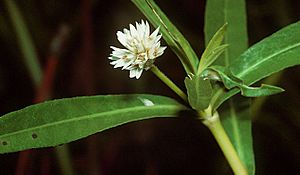Alternanthera philoxeroides facts for kids
Quick facts for kids Alternanthera philoxeroides |
|
|---|---|
 |
|
| Scientific classification | |
| Kingdom: | |
| (unranked): | |
| (unranked): | |
| (unranked): | |
| Order: | |
| Family: | |
| Genus: |
Alternanthera
|
| Species: |
A. philoxeroides
|
| Binomial name | |
| Alternanthera philoxeroides (Mart.) Griseb.
|
|
Alternanthera philoxeroides is a plant commonly known as alligator weed. It is an aquatic plant, meaning it grows in or near water. You can often find it in waterways like rivers, canals, and ponds. Alligator weed is considered an invasive species, which means it grows very fast and can cause problems for the environment and other plants and animals in areas where it doesn't naturally belong.
Contents
What is Alligator Weed?
Alligator weed is a type of plant that loves water. It can grow both floating on the water's surface and rooted in the soil underwater. It has hollow stems that help it float and spread easily.
How it Looks
- Alligator weed has long, green stems that can grow up to 10 meters (about 33 feet) long.
- Its leaves are shiny and narrow, shaped like a spear, and grow in pairs along the stem.
- It produces small, white, papery flowers that look a bit like clover. These flowers grow on short stalks from the leaf joints.
Where it Comes From
This plant originally comes from South America, especially the Amazon River basin. However, it has spread to many other parts of the world, including North America, Asia, Australia, and parts of Africa. It likely spread through human activities, like boats carrying plant pieces or people accidentally moving it to new places.
Why Alligator Weed is a Problem
Alligator weed is a big problem because it grows so quickly and aggressively. When it invades a new area, it can take over very fast, outcompeting native plants and changing the environment.
Impact on Waterways
- Blocks Water Flow: Thick mats of alligator weed can cover the surface of rivers, canals, and lakes. This can block boats from moving and make it hard for people to fish or swim.
- Harms Aquatic Life: The dense mats reduce the amount of sunlight that reaches the water below. This can kill off native underwater plants that need sunlight to grow. It also lowers the oxygen levels in the water, which can harm fish and other aquatic animals.
- Changes Habitats: By taking over, alligator weed changes the natural habitats of many animals. Birds, fish, and insects that rely on native plants for food and shelter might struggle to survive.
- Increases Flooding Risk: In some areas, the thick growth can clog drainage systems, leading to increased risk of flooding, especially during heavy rains.
How it Spreads
Alligator weed mostly spreads through small pieces of its stem or roots. Even a tiny piece can grow into a whole new plant. This makes it very hard to control.
- Water Currents: Pieces of the plant can break off and float downstream, rooting in new locations.
- Boats and Equipment: Boats, fishing gear, and even construction equipment can pick up plant fragments and carry them to new bodies of water.
- Gardening: Sometimes, people unknowingly use alligator weed in their gardens or ponds, which can then escape into natural waterways.
Controlling Alligator Weed
Because alligator weed is so invasive, people try different methods to control its spread and reduce its impact.
Methods Used
- Physical Removal: Sometimes, people try to remove the plant by hand or with machines. However, this can be difficult because any small piece left behind can regrow.
- Chemical Control: Special herbicides (plant-killing chemicals) can be used, but this must be done carefully to avoid harming other plants or animals.
- Biological Control: This is a natural way to fight the weed. Scientists have found insects from South America, like the alligator weed flea beetle, that eat only alligator weed. Releasing these insects in affected areas can help control the plant's growth without harming other species.
Controlling alligator weed is an ongoing challenge, but it's important work to protect our waterways and the plants and animals that live in them.
See also
 In Spanish: Lagunilla para niños
In Spanish: Lagunilla para niños
 | Ernest Everett Just |
 | Mary Jackson |
 | Emmett Chappelle |
 | Marie Maynard Daly |

